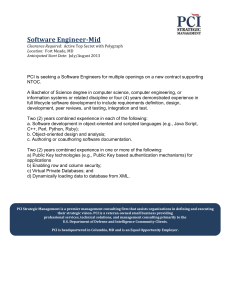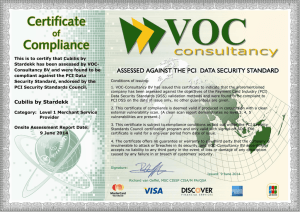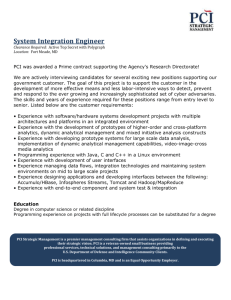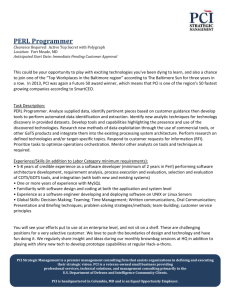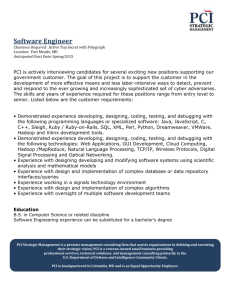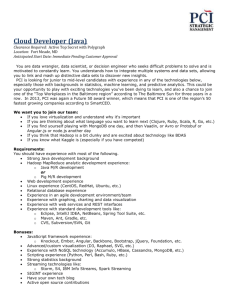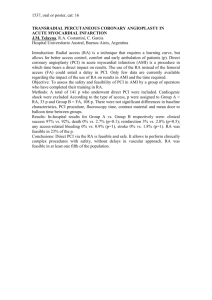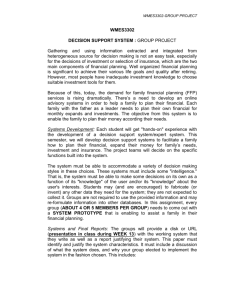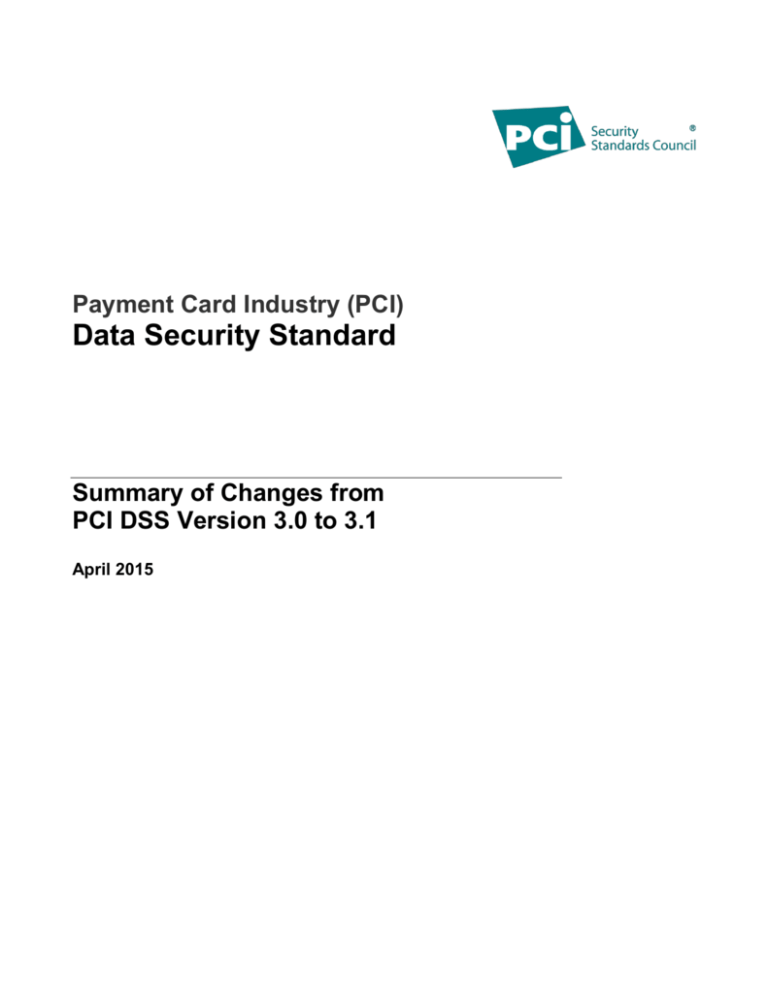
Payment Card Industry (PCI)
Data Security Standard
Summary of Changes from
PCI DSS Version 3.0 to 3.1
April 2015
Introduction
This document provides a summary of changes from PCI DSS v3.0 to PCI DSS v3.1. Table 1 provides an
overview of the types of changes. Table 2 summarizes the material changes found in PCI DSS v3.1.
Table 1: Change Types
1
Change Type
Definition
Clarification
Clarifies intent of requirement. Ensures that concise wording in the standard portrays the
desired intent of requirements.
Additional
guidance
Explanation, definition and/or instruction to increase understanding or provide further
information or guidance on a particular topic.
Evolving
Requirement
Changes to ensure that the standards are up to date with emerging threats and changes in
the market.
Summary of Changes from PCI DSS Version 3.0 to 3.1
Payment Card Industry (PCI) Data Security Standard
© 2006-2015 PCI Security Standards Council, LLC. All Rights Reserved.
April 2015
Page 2
Table 2: Summary of Changes
Section
Change
PCI DSS v3.0
Type
1
PCI DSS v3.1
All
All
Addressed minor typographical errors
(grammar, punctuation, formatting, etc.) and
incorporated minor updates for readability
throughout the document.
Clarification
Introduction
Introduction
Changed reference from “protecting cardholder
data” to “protecting account data”.
Clarification
Introduction
Introduction
Clarified that PCI DSS applies to any entity
that stores, processes or transmits account
data.
Clarification
Introduction
Introduction
Changed reference from “personally
identifiable information” to “personal
information”.
Clarification
PCI DSS Applicability
Information
PCI DSS Applicability
Information
Changed reference from “financial institutions”
to “acquirers, issuers”.
Clarification
PCI DSS Applicability
Information
PCI DSS Applicability
Information
Removed reference to “environments” to clarify
applicability at the organization level rather
than the system level.
Clarification
Scope of PCI DSS
Requirements
Scope of PCI DSS
Requirements
Aligned with language used earlier in the same
section regarding steps for confirming
accuracy of the defined CDE.
Clarification
Use of Third Party
Service Providers /
Outsourcing
Use of Third Party
Service Providers /
Outsourcing
Clarified that validation processes for service
providers include undergoing their own annual
assessments or undergoing multiple ondemand assessments.
Clarification
PCI DSS Assessment
Process
PCI DSS Assessment
Process
Reordered assessment steps to clarify that a
ROC, SAQ, or AOC may be submitted without
all requirements being “in place”.
Clarification
General
General
Updated language in requirements and/or
testing procedures for consistency.
Clarification
2.2.3
2.2.3
Removed SSL as an example of a secure
technology. Added note that SSL and early
TLS are no longer considered to be strong
cryptography and cannot be used as a security
control after June 30, 2016. Additional
guidance provided in Guidance column. Also
impacts Requirements 2.3 and 4.1.
Evolving
Requirement
2.3
2.3
Removed SSL as an example of a secure
technology and added a note to the
requirement. See explanation above at 2.2.3.
Evolving
Requirement
Summary of Changes from PCI DSS Version 3.0 to 3.1
Payment Card Industry (PCI) Data Security Standard
© 2006-2015 PCI Security Standards Council, LLC. All Rights Reserved.
April 2015
Page 3
3.2.1 – 3.2.3
3.2.1 – 3.2.3
Clarified in requirements that storage of
sensitive authentication data is not permitted
“after authorization”.
Clarification
3.4
3.4
Clarified in requirement note that additional
controls are required if hashed and truncated
versions of the same PAN are present in an
environment. Added Testing Procedure 3.4.e
to assist with validation of the Note. Clarified
intent of “truncation” in Guidance Column.
Clarification
3.5.2
3.5.2
Clarified that “HSM” may refer to a “Hardware”
or “Host” Security Module. Aligned with
language in PCI PTS.
Clarification
3.6
3.6
Clarified that Testing Procedure 3.6.a only
applies if the entity being assessed is a service
provider.
Clarification
4.1
4.1
Removed SSL as an example of a secure
technology and added a note to the
requirement. See explanation above at 2.2.3.
Evolving
Requirement
4.1.1
4.1.1
Updated testing procedure to recognize all
versions of SSL as examples of weak
encryption.
Evolving
Requirement
4.2
4.2
Included SMS as an example of end-user
messaging technology and added guidance.
Clarification
Additional
Guidance
6.6
6.6
Added clarification to testing procedure and
Guidance column that if an automated
technical solution is configured to alert (rather
than block) web-based attacks, there must also
be a process to ensure timely response.
Clarification
8.1.4
8.1.4
Clarified that inactive user accounts must be
removed/disabled within 90 days.
Clarification
8.1.6.b
8.2.1.d
8.2.1.e
8.2.3.b
8.2.4.b
8.2.5.b
8.1.6.b
8.2.1.d
8.2.1.e
8.2.3.b
8.2.4.b
8.2.5.b
Clarified that Testing Procedure only applies if
the entity being assessed is a service provider,
and for non-consumer customer accounts.
Clarification
8.2.4
8.2.4
Clarified that passwords must be changed at
least once every 90 days.
Clarification
8.5.1
8.5.1
Clarified this requirement only applies if the
entity being assessed is a service provider.
Clarification
Summary of Changes from PCI DSS Version 3.0 to 3.1
Payment Card Industry (PCI) Data Security Standard
© 2006-2015 PCI Security Standards Council, LLC. All Rights Reserved.
April 2015
Page 4
9.2
9.2
Clarified that the requirement applies to all
onsite personnel and visitors.
Combined Testing Procedures 9.2.b and 9.2.d
to remove redundancy.
Clarification
9.9.1.b
9.9.1.b
Updated testing procedure to clarify both
devices and device locations need to be
observed.
Clarification
10.6
10.6
Removed redundant language in guidance
column.
Clarification
10.6.1
10.6.1
Updated requirement to more clearly
differentiate intent from Requirement 10.6.2.
Clarification
11.1.c
11.1.c
Clarified that testing procedure applies where
wireless scanning is utilized.
Clarification
11.2
11.2
Clarified in Guidance Column that a
vulnerability scan could be a combination of
automated and manual tools, techniques, or
other methods.
Additional
Guidance
11.3.2.a
11.3.2.a
Removed redundant language from testing
procedure.
Clarification
11.3.4
11.3.4
Clarified that the intent of the penetration
testing is to verify that all out-of-scope systems
are segmented (isolated) from systems “in the
CDE”.
Clarification
11.5
11.5
Clarified that unauthorized modifications
include changes, additions, and deletions of
critical system files, etc.
Clarification
12.2
12.2
Clarified that the risk assessment process
must result in a formal, “documented analysis
of risk”.
Clarification
12.9
12.9
Clarified this requirement only applies if the
entity being assessed is a service provider and
added related guidance.
Clarification
Additional
Guidance
Appendix C:
Compensating
Controls Worksheet –
Completed Example
Appendix C:
Compensating
Controls Worksheet –
Completed Example
Updated description of compensating control
example to reflect use of “sudo” rather than
“SU” for improved technical accuracy.
Summary of Changes from PCI DSS Version 3.0 to 3.1
Payment Card Industry (PCI) Data Security Standard
© 2006-2015 PCI Security Standards Council, LLC. All Rights Reserved.
Additional
Guidance
April 2015
Page 5

